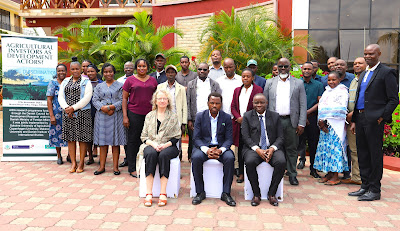The government’s efforts to improve agricultural production and investment environment in the sector have led to Tanzania attracting more investors in the agricultural sector in the East African region.
 |
| Acting Regional Administrative Secretary of Iringa Region, Mr. Elias Luvanga, sitting (in the middle) in a group photo with various stakeholders who reached feedback on the research, on the right sitting is Prof. Karimuribo and on the left is Dr. Helle Ravnborg |
Speaking in Iringa region on the day of presenting the results of the ‘Are Agricultural Investors Development Partners?’ (AIDA) research, the Acting Regional Administrative Secretary of Iringa Region, Mr. Elias Luvanda, said that the research is of great benefit to the country of Tanzania. He mentioned that the research, despite having positive results in some areas, will help the government to improve and update its policies, laws, and guidelines to be more friendly to agricultural investors and stakeholders, reflecting the reality in the country.
 |
| The Acting Regional Administrative Secretary of Iringa Region, Mr. Elias Luvanga, conducts a workshop on the results of the research |
Speaking immediately after the presentation of the research results, the Director of the Directorate of Postgraduate Studies, Research, Technology Transfer, and Consultancy, Prof. Esron Karimuribo, stated that the research results have clearly shown the significant contribution and good investment policies of Tanzania. He mentioned that as a result, investors have been able to have their place in providing employment, although not to the expected extent. Additionally, water resources are available in the areas where they conduct their activities.
 |
| The Director of the Directorate of Postgraduate Studies, Research, Technology Transfer, and Consultancy, Prof. Esron Karimuribo, speaking at the workshop” |
Initially, while presenting the results of this research, Senior Researcher from Sokoine University of Agriculture (SUA), Dr. Evelyne Lazaro, stated that despite the specific goal of the research, they also looked at investment and its effects on development. She mentioned that the areas they examined in this regard include the impact on land availability, employment, and overall development. Although employment has been one of the criteria for investment, the results show that employment is limited compared to expectations.
In Tanzania, these large farms have not significantly affected land security, and this is because Tanzania has good regulations and laws for land ownership for both investors and citizens,” said Dr. Evelyne Lazaro.Regarding food security, Dr. Evelyne Lazaro mentioned that investors have contributed to some extent because people with income are able to buy food, thus improving the situation for households around the investors’ farms.
 |
| Dr. Lazaro presenting the research results |
Professor Khalmadin Mutabazi, who is also a senior researcher from the Sokoine University of Agriculture (SUA), has said that despite the good intentions of investment, there were situations where farmers benefited and sometimes did not benefit from the investment. Although new opportunities have come for farmers, they also have their own plans, so when opportunities arise, they take time to evaluate and see what can help them more. For example, farmers in Iringa and Njombe invested more in timber farming, but now they are investing more in avocado farming,” said Prof. Khalmadin Mutabazi.
 |
| Prof. Khalmadin Mutabazi speaking at the workshop. |
Dr. Helle Ravnborg from the Danish Institute for International Studies (DIIS) stated in the research that they have observed more than 100 investors in the agricultural sector from Denmark, divided into three groups: private investors, institutions, and companies. It appears that private investors are more beneficial to the surrounding community compared to companies and institutions. Additionally, farmer Nicodemus Malley from Oldeani village in the Karatu district of Manyara region has urged the government to assist farmers in land ownership to resolve potential conflicts between them and investors.
He emphasized the difficulty faced by farmers and other citizens in land ownership, and suggested that the government could genuinely strive to ensure equity between them and investors to uplift their incomes, including educating children through agricultural activities. Presenting the research findings, PhD student Festo Maro mentioned that 10% of farmers in Iringa and 18% of farmers in Njombe have been motivated by investors to cultivate soybeans and avocados, which they were not previously growing.
 |
| PhD student Festo Maro presenting the research findings. |
Moreover, the results have shown that 26% of farmers in Njombe exchanged information with investors about new crop seeds, new fertilizer technologies, and planting methods, while Karatu was 1.2% and Iringa was 16%. In other results, the research has shown that 74% of small-scale farmers in Iringa received inputs and chemicals from investors, while Njombe was 26%.
The results also showed that 62% of farmers from Njombe entered into agreements with investors to cultivate crops based on quality standards in production. This research, called ‘Are Agricultural Investors Development Partners?’ (AIDA), was conducted by SUA, Makerere University, Denmark, and the Danish Institute for International Studies, involving various stakeholders in Karatu, Iringa, and Njombe, and was funded by the Danish Development Agency (DANIDA).


 : Congratulations Prof. Eliakim Zahabu
: Congratulations Prof. Eliakim Zahabu A Triumph in Wildlife Research: Congratulations to Dr. Leticia Muses on Her PhD Defense!
A Triumph in Wildlife Research: Congratulations to Dr. Leticia Muses on Her PhD Defense! 